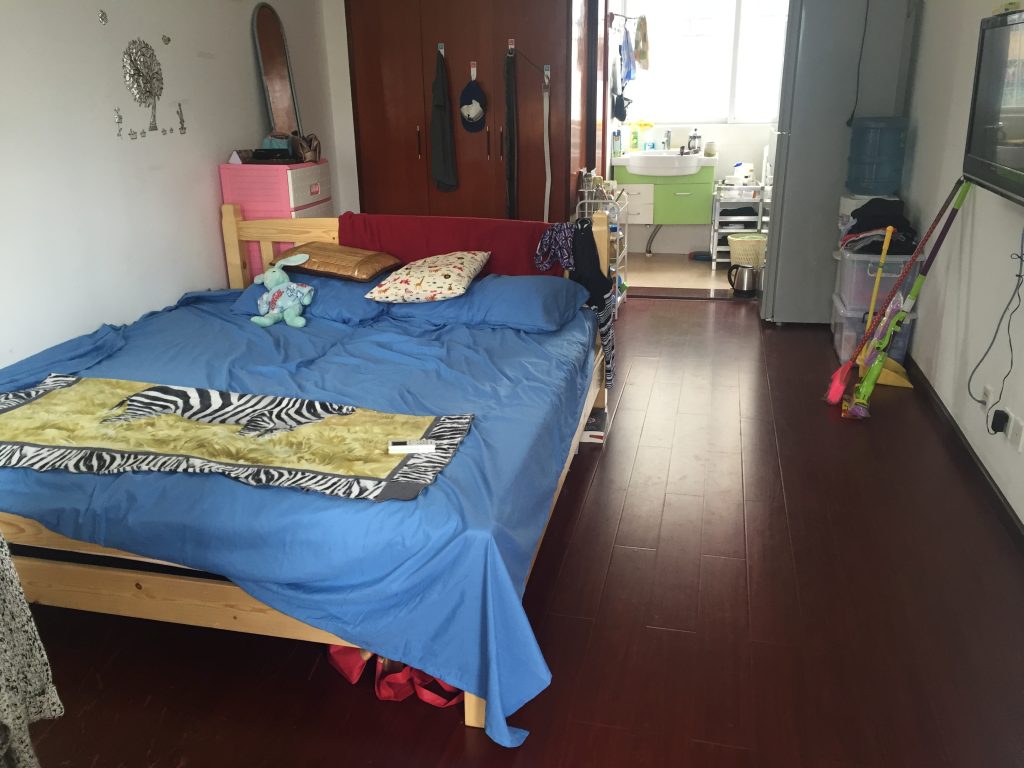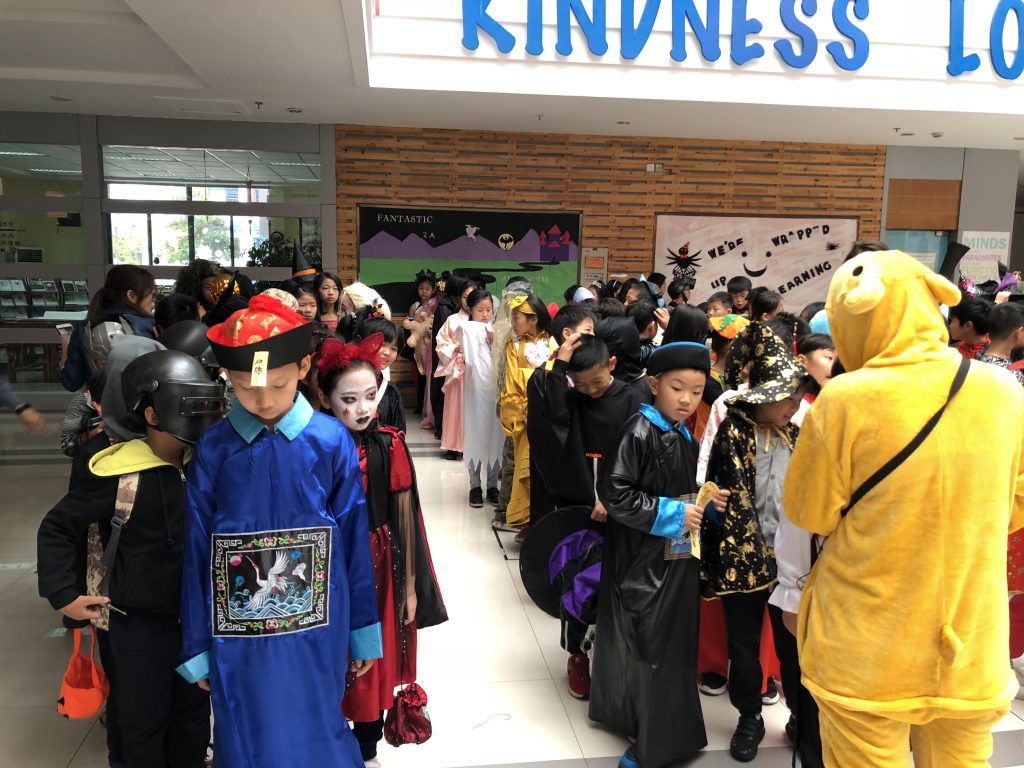Why should you teach English in China? Well, few countries have the high salaries, ultra-modern mega cities, and relatively convenient lifestyle that you can expect living in China. And for those trying to brush up on their Mandarin skills, this is just icing on the cake!
So let’s break down some of the requirements to teach in China as well as what types of teaching jobs this country has to offer.
About Teaching English in China

Guiyang, China Skyline
Teaching English in China can be an extremely lucrative job (or career, depending on your aspirations). The demand for English teachers in China is consistently high everywhere, with every parent wanting their child to take English from a very young age to stay competitive in its crazy job market.
China pays among the highest salaries for English teachers. You can see the full list of Asian countries to teach and salaries here.
The country is teeming with ESL jobs that range from public schools, bilingual and international schools, kindergartens, training centers, tutoring, and more, which we’ll get into later in this guide. Because of the entrepreneurial spirit in China, there always seems to be a side hustle or tutoring job available for those looking to pad their salary with an extra 2000RMB -10,000 RMB ($280 – $1,400 USD).
What are the Requirements to Teach English in China
Now that I’ve enticed you with this rich ESL job market and the myriad ways that you can earn a living teaching English in China, you may be wondering what the catch is. Well, the requirements to teach in China are numerous and often changing. In simple speak, it can be an expensive headache, especially due to COVID-19 measures that continue to exist in the country well past the rest of the world learning to live with the virus.
To keep this simple, let’s first start with the basic requirements to teach English in China:
- Passport from a native English speaking country
- Between the ages of 18-60 (men) 18-55 (women)
- A Bachelor’s degree
- A 120 hour TEFL (or 2-years experience)
- Criminal background check
- Good health
Passport from a native English speaking country:
The native English countries, as defined by the Chinese government for teaching positions include: UK, Ireland, USA, Canada, Australia, New Zealand and South Africa.
Note that there are companies (especially training centers or other less regulated companies) that will advertise hiring non-native English speakers. This is technically illegal, as they cannot get you the legal teaching visa required for an ESL job. If the police show up at your employer (which they often do), then you run the risk of being fined or deported if caught.
We will speak more about visas for work later in this article.
Between the ages of 18-60 (men) and 18-55 (women)
The retirement age for men in China is 60 years and for women it’s 55 years. China sticks to those ages as the cutoff for teachers who are coming to teach in China.
A Bachelor’s Degree
You must have a bachelor’s degree from you home country. The type of degree is not significant, but having one is imperative.
The bachelor’s degree must be notarized and authenticated according to your home country’s standards and also legalized by your local Chinese Embassy/Consulate.
120 Hour TEFL Certificate
To teach, you must have a minimum of 120 hour TEFL certificate. You can have more than 120 hours (like 180 hour, etc) but the minimum is 120 hours. That means a 40-hour or 60-hour TEFL, while super helpful to learn the basics of teaching English in a foreign language, are not going to suffice.
The TEFL certificate must be accredited, meaning that it has been reviewed and approved by a recognized, independent organization.
In lieu of a TEFL, you can prove that you have at least 2 years of experience teaching. Proving the 2 years of teaching experience often requires you to have some sort of official letter on school letterhead stating the time period you worked, your role as a teacher, and signature from your superior.
Like your bachelor’s degree, your 120 hour TEFL certificate will need to be authenticated in the country of origin and then also legalized by your local Chinese Embassy/Consulate.
So, if you chose to take your TEFL course with TEFL Hero, you would need to get your TEFL authenticated in the USA before being legalized. This can be a long and expensive process (which is often covered by your school) and is often easier done with an agent once you are TEFL certified. We recommend Teaching Nomad for Americans looking to authenticate all their documents before moving to China.
For brevity sake, we aren’t going to go into details on the authentication and legalization process for every country, but you can do a quick google search to find an agent to walk you through the current process in your home country.
Criminal Background Check
Depending on your country of origin, you will need to either get an FBI background check or a criminal background check from your home country. It should be less than 6 months old from the date of applying for your visa and also be notarized, authenticated, and legalized.
Good Health
To obtain your residence permit to teach English in China, you will need to go through a full medical exam in China (and perhaps one in your home country as well). The medical exam in China generally involves a chest X-ray, ECG, urine sample, blood sample, etc. If you test positive for certain viruses or diseases such as HIV, hepatits, or tuberculosis, then you will likely be denied your work permit.
As of now, medical checks do not test for illicit drugs, but drug testing in China at bars or restaurants frequented with foreigners is not uncommon.
Teaching English in China Salary

China pays teachers in renminbi, which can be pronouned as “RMB” or “yuan”
Now that you know whether or not you can meet the requirements to teach English in China, let’s talk about the different types of salaries you may expect to make in China. Overall, a teacher in China can expect to make between 12,000 – 45,000+ RMB ($1,600 – $6,300USD) in China depending on what kind of school you are working in as well as how long you have been teaching in China.
A note here is that salaries can vary widely depending on how many hours you want to work, what city you are working, as well as your qualifications to teach and ability to negotiate in China. We are providing a ballpark of what you can expect, including once you are actually living in China and can leverage your immediate availability in the country for higher pay. I’ll also be providing some tips on negotiating your salary or other benefits before accepting a job offer.
Training Center Salary:
Salary Range: 15,000-25,000RMB

Smaller class sizes and more freedom in classroom activities make training centers a fun teaching job
Training centers have been hit by China’s “double reduction policy” that has attempted to make it cheaper for average families to raise children. This means that many training centers have been shut down due to the policy.
If you are still able to find a training center job, you can expect to work weeknights and weekends teaching kids pretty much during any hours they aren’t in school. These hours can be great for people who want to sleep in during the day or who have late night hobbies such as playing in bands, acting, stand up, etc. These hours can be seen as a positive or negative, depending on your priorities and preferred sleeping schedule.
Training center teaching hours often fall between 15-25 hours per week and many employers will ask you to also add office hours so that you are still “working” 40 hours per week. There is usually not much to grade outside of class at training centers, so these office hours are usually spent by many teachers watching Youtube or playing video games. If being mandated to sit around for an extra 15-20 hours bothers you like it did for me, then I suggest trying to negotiate office hours from your contract.
Kindergarten Salary:
Salary Range: 25,000-35,000
Kindergartens can be a very lucrative job, as you can see by the salary. Oftentimes, you can opt for a lower salary 25,000 RMB to just work mornings (7AM-12PM) Monday-Friday or full salary of about 35,000+ RMB if you want to work full school days 7AM-4PM with about an hour or so lunch break in-between.
I personally have known teachers who worked these half-day schedules and absolutely loved having the rest of the day to pursue their own hobbies.
Public School Salary:
Salary Range: 12,000-22,000

A public school class size can have up to 50 students
Public schools are often lower paying than other teaching jobs, but have the huge benefit of an extremely light workload and working hours that still fit during the typical school day. You can expect to work anywhere from 12-18 teaching hours at a public school and be off during your weekday evenings and weekends. Public school jobs are much less stressful than other jobs, but the tradeoff is a much lower salary.
Public school teachers also often enjoy long public holidays (up to 5-7 weeks) that are paid during the school year (but they are likely not paid for summer holidays).
Some public schools will include office hours (meaning when you are not teaching from 8AM-4PM, you are in the office grading, lesson planning, or, oftentimes, just sitting around). When negotiating an offer, it may be worth trying to reduce those office hours, as oftentimes these sorts of jobs don’t include any written work to grade.
You may also be able to negotiate your schedule to have classes back-to-back so that you can essentially teach half-days. Again, these negotiations tend to be easier once you are in-country and have more sway as a candidate who is already within China and ready to work.

Some public school jobs can include free on-campus housing (which is often quite basic)
The above studio is where I lived my third year teaching English in Shenzhen. As far as amenities go, it was quite lacking, but it was provided to me for free and I wasn’t about to complain!
Bilingual School Salary
Salary Range: 24,000-32,000RMB

Class sizes can still range in the 30’s for bilingual schools
Bilingual schools in China walk a fine line between public school and international school. Oftentimes, they do not meet the requirements for being an “international school,” but they still can charge a premium to parents who do not want their children to go through the public school system.
Bilingual schools often teach classes in both Chinese and English and will employ native speakers to teach subjects outside of English as well.
You can expect to work from 7AM-5PM Monday to Friday and teach 12-22 teaching hours per week. These teaching hours may seem relatively light compared to training centers, but bear in mind that much of your spare time during the workweek will be spent grading. Classes in bilingual schools can range from 30-50 kids per class, and grading work is often part of the requirements of the education system in China.
International School Salary
Salary Range: 24,000-45,000+ RMB

Expect to participate in school-wide activities at international schools, such as dressing up for Halloween
International schools often share a lot of similar qualities to bilingual schools with the exception that they are categorized as international, meaning the students are technically required to have foreign passports (not Chinese) to attend classes.
Getting jobs at international schools becomes more competitive than bilingual and public schools and often, more prestigious international schools will require at least a teaching certification (and some would prefer a masters in education as well).
If you are a certified teacher, you can certainly command a much higher wage, especially if you have some experience teaching in China prior to applying.
Teaching at an international school, you can expect to have a greater set of responsibilities in the classroom and at the school. On top of teaching 12-20 hours per week, you will be expected to engage in the academic community and participate in professional development. As with the bilingual schools, international schools will require you to grade each student’s work.
Of all the places you can teach English in China, working at an international school is the most prestigious and highest paying. However, with great power (or pay) comes great responsibility. You will be expected to dress professionally daily, have regular communication with parents and staff, and be an active member in the school community.

“Santa” coming to visit my students in a Shanghai international school
Is it easy to save money while teaching in China?
I have taught English in Shenzhen as well as in Shanghai, China across various types of schools (public school, international school, and training center) and know teachers from all of these schools who have been able to save at least several thousand USD per year.
One teacher from my public school teaching days in Shenzhen was able to save nearly $10,000USD from a $15,000USD/year salary after one year because her school provided her a free living accommodation on campus and she lived a very modest lifestyle. She likely was also cushioning her earnings with part-time tutoring gigs on the side. Although it’s not legal to work outside of the job that provides you with a visa, tutoring in student’s homes is a very common side business that pays well.
So, after seeing how much is possible to save off a low salary at a public school, imagine how much you can save If you’re pulling an international school salary of 32,000RMB per month ($4,500USD). If you are careful with your money, you should be able to save way more, depending on your spending style.
For many teachers hoping to earn a bit more, they can often make up to 500 RMB ($70USD) per hour tutoring and up to 2,000 RMB ($280USD) per day working at camps over the summer and winter holidays. Keep in mind, working any jobs outside of the one that provided you your visa is technically illegal. If the summer or winter camp you are working at over your breaks get raided by police (which is not uncommon), you still could face fines or deportation.

It’s all fun and games tutoring young learners
Tips on negotiating a higher salary in China
1. Always aim for the higher level of the salary range listed for the job
This seems hard to do, especially if you are new to teaching and not in the country yet, but you should try your best to make the case as to why you deserve the higher range of the salary advertised. Most companies are hiring new teachers to China at extremely low pay, knowing there will be high turnover once you arrive to China and see the wages you can demand once in-country.
2. Play up any past experience working with kids or people
You don’t need to have “teaching” experience, per se, but you should definitely talk about times you have worked with kids or taught adults and about the passion you had from that experience.
3. Negotiate on your contract bonus
Oftentimes, a school may push back on your insistence on a higher salary. Hiring managers tend to have a certain budget for the year and try to stay within that. The contract bonus, however, seems to be a bit more flexible, given that there is a chance you will not complete your contract and, hence, they won’t owe you this money.
Your end of contract bonus could be more than a month or two months of take-home pay, so it’s definitely worth it to push for as much as you can get.
Other work benefits:
When looking at salaries, it’s important to keep in mind that often there are plenty of additional benefits to teaching in China beyond the base salary. All workers are legally entitled to health insurance (whether or not it’s good is up to your employer) and most companies will entice teachers with other benefits such as:
Health Insurance:

Health insurance for teachers in China often covers high-quality international wings of hospitals (source)
Chinese citizens have free public healthcare from their social insurance, but foreigners coming to work in China are legally entitled to company-sponsored health insurance. If you are working for a good international school or bilingual school, then you will probably have a very comprehensive international health insurance plan that covers private, international hospitals and clinics as well as has benefits such as dental.
Although nice, international hospitals in China are affordable by US standards, they can still get pricey if you have a procedure or surgery. This is why reading up on your health insurance plan provided by your company is super important.
That said, there are a lot of health insurance plans that are quite clearly chosen for their affordability from the employer and are not very robust.
“I’ve worked for a training center in Shanghai had a health insurance plan that only covered the first 1000 RMB per visit ($140USD). That covers a quick visit to the doctor or maybe some quick bloodwork, but if I had gotten into a bad accident, I would have been looking at a pretty steep healthcare bill. With this in mind, I ended up buying my own private health insurance plan to add on top of this current plan just to make sure I didn’t find myself racking up hospital bills due to some unexpected emergency.”
Housing Stipend:
This may be the first time you’ve encountered a housing stipend and you may find yourself wondering “why would they offer me a base salary + housing stipend?” rather than just a larger salary. Well, the housing stipend is a chance for your employer to pay you money without it being taxed. That can save you close to 10% of your salary from being taxed. Generally, your housing stipend can only be up to a certain amount of your salary, but you will receive this every month with your monthly paycheck.
Lower Tax Rate
In many parts of China, there is a fapiao system that allows foreign workers to submit certain expenses to their HR in the form of official receipts that allow for you to reduce your taxable income. With the fapiao system, you benefit from an extremely low tax rate (could be as low as ~10% depending on your teaching income).
Contract Bonus
Most schools will offer a bonus for completing your contract, which is usually a one or two-year contract. These contracts are often large enough to encourage teachers to stay and not quit their job in the middle of the school year.
Free Lunch

Most teachers receive free lunch on campus
Most schools have on-campus dining with Chinese and Western options and teachers are often entitled to a meal either for free or at a pretty reduced cost (like 10 RMB / $1.40 USD).
Where Should I Live in China?
A Chinese “village” can consist of several million people. There are too many cities in China to discuss here, and I just want to focus on what I’d consider the most livable cities in China – the Tier 1 cities. If you’re interested in Tier 2-4 cities, you can see this list.
What’s a Tier 1 City?
China’s cities are often broken out into unofficial tiers, or levels, based on development. Tier 1 is the most highly developed and economically vibrant. Tier 4 is the lowest level of city. I’m only going to discuss Tier 1 cities (original and new Tier 1 cities)
Original Tier 1 Cities
Includes: Shanghai, Guangzhou, Shenzhen, Beijing
I have personally lived in Shanghai, Guangzhou, and Shenzhen. I would consider all Tier 1 cities to have a quality of life I’d expect in any international city in the world, with many who speak English, food and shopping I could get in any big city, and lots of other international travelers or workers. Here are my recommendations for who would thrive in each:
Shanghai

Shanghai Skyline on a blue sky day
Most people who have spent time around China would agree with me when I say that Shanghai is by far the coolest and trendiest city in China. It has a huge international scene and is known as the “Paris of the East” due to its heavy French influence as well as other foreign influences in this major port city.
Shanghai is a gigantic city with several provinces, the most innermost provinces where most foreigners reside being Xuhui, Jing’An, Huangpu, and Changning. This is where you will find streets lined with hip, instagrammable cafes, bars and restaurants, and boutique shops and galleries. The downside to these provinces is that rent can be quite expensive. Rent for a decent one bedroom apartment in Jing’An will likely run you 10,000 RMB ($1,400 USD).
Of course, if you are budgeting, you can find a studio for less or even find roommates.
Beijing

After Shanghai, I’d recommend Beijing as the other top international city in China that offers enough western conveniences that you likely won’t miss for home too much.
Beijing, as China’s capital, has more historic places to visit and has an overall different vibe from the swanky, cosmopolitan Shanghai. Beijing has a much more historical and old-school presence and is missing the sexy Shanghai skyline and European essence.
I have not lived in Beijing, but would expect rental to be comparable to Shanghai when living in the cooler neighborhoods catered to westerners and international Chinese.
For those who enjoy four seasons, however, Beijing is likely going to be the only international city in China that has cool enough weather to qualify as a true winter. Shanghai, being on the Eastern coast of China, has a very temperate climate, with very mild winters and extremely hot and humid summers.
Guangzhou

Guanghzou, in some regards, may be the most “authentic” of the Tier 1 cities. From the cuisine to the people, it felt much more local than Beijing and Shanghai.
With less of an international influence, you’re going to come face-to-face with more Chinese culture. This is probably a very good Tier 1 destination for teachers who also want to improve their Chinese and be a bit more immersed in Chinese culture. Rent in areas of Guangzhou are more affordable than other Tier 1 cities.
Shenzhen

View from apartment in Shenzhen’s Futian district
The new kid on the block, Shenzhen is a newer city in China (designated a Special Economic Zone) that China has poured resources into for growth and industry. Known as the Silicon Valley of China, young entrepreneurs from around China flood into Shenzhen to start their buzzy tech businesses and amass their riches.
Because Shenzhen is so new, you will enjoy newer buildings, a great, well-laid out city with numerous parks and greenery, an advanced public transportation system.
Sharing a border with Hong Kong, you can simply take a bus or ferry and be in the center of Hong Kong in a few hours.
Lastly, and probably just as important as any other reason to move to a city in China, is that the air here is significantly better than most other cities in China. Rarely reaching levels known to cause adverse health effects, you can enjoy fresh air and nature in this gem in the China’s Guangdong district.
New Tier 1 Cities
Includes: Chengdu, Hangzhou, Chongqing, Wuhan, Nanjing, Xi’An, Suzhou, Tianjin, Changsha, Zhenghou, Dongguan, Qingdao, Shenyang, Hefei, Foshan

Hangzhou, China – a short hour-long high speed train from Shanghai, Hangzhou is a very livable city known for its tourism.
I’ve not personally lived in these new tier 1 cities but have visited several. What you should expect from these types of cities is more Chinese culture and history, fewer (but still plentiful) western amenities, fewer people who can speak English, and probably a bit more stares from locals.
These can be fantastic choices for teachers who want to learn Chinese, aren’t looking for western luxuries that you may expect from home, and who don’t mind not having as much of an “international” feel in terms of community from expats and other teachers.
Tips for moving to China
Research areas of the city
As with moving into any city, it’s helpful to consider areas of the city that you may want to live in. I’ve made the mistake of taking a job in the “suburbs” of Shanghai (Songjiang district), thinking it would be nicer and have better air than inner city. It wasn’t. I don’t like commuting, so I finished the school contract living in an area of the city with few other foreigners and no real culture.
Consider your commute
Often, international schools are located in the outer edges of cities. For example, most international schools in Shanghai are located in the Pudong district. Most teachers would not choose to live in this district because it is far from the cool restaurants and things to do in the city. If that sounds like you, then you will likely have to commute to some degree.
If you want to live where the action is, but it looks like an hour long commute on the metro to get to work, this should be something that you heavily consider when taking a new job. I know many friends who commuted an hour each way for work, often leaving for work at 6:30 in the morning to be at school when their students arrived.
Have at least a few thousand USD saved before arriving
This is something that most schools fail to mention when you are moving to China for the first time.
Most Chinese nationals have an extremely high savings rate, close to 36% of net household income, so shelling out the entire amount upfront for subscription-type services for the year is quite normalized.
You may need to pay for upfront for your internet or cell-phone plan, your gym membership, and even a portion (3 months) of your year’s rent.
When you sign a contract for an apartment, your landlord will ask for the first month rent as a safety deposit as well as two additional months upfront. For an apartment that costs 10,000 rmb/month ($1,400), this can be nearly $4,200 USD paid upfront.
Your employer may be able to give you a cash advance on your first month of work, but this is not a guarantee. I advise all newcomers to China to have at least $4,000-$5,000 in savings in USD before moving.
How to find jobs teaching English in China
It’s not hard to find a job teaching English in China while living outside of the mainland. The problem is, many jobs to teach English aren’t advertised on job boards and are often recruited for within the country.
With that in mind, it’s best to consider your first gig teaching English in China as your launch off point to a slew of options that will present themselves once you are living in China, meeting other teachers, and have access to more recruiters and schools.
Here is where you should start if you’re looking for a job outside of China:
Recruiters:
Teaching Nomad

Using recruiters is often one of the fastest ways to get your CV in front of several schools and get a job teaching English in China fast. When you work with Teaching Nomad, you’ll get paired with a rep who will help walk you through your interview and negotiations.
We are not affiliated with Teaching Nomad, but I did get an international school job in Shanghai with Teaching Nomad in 2018, so I have personally utilized their services and was happy enough with the process.
Job Boards
eChinacities

eChinacities is a great job board for all types of jobs in China for foreigners, and you can filter through for teaching jobs in cities that you are interested in. It is teeming with recruiters, so chances are, once you upload your CV to your profile, you will be contacted via email by recruiters with jobs that you didn’t even apply for.
You can find jobs on LinkedIn and plenty of recruiters also lurk on this social media.
How to Get Hired Teaching English in China
1. Get your CV up to date
First and foremost, make sure your CV is up to date with your education, past experience, and with a photo on your CV. This one can be important, as it shows the school or employer what you look like. For better or worse, what you look like still goes into consideration at many schools looking to hire foreigners.
2. Practice your interviewing skills
Schools look for teachers who seem upbeat, passionate, and excited about teaching English. Many schools for kids (like training centers, primary schools, and kindergartens) are seeking a “type” of teacher that is going to be happy, smiling in photos with kids, and who is engaging for parents.
3. Don’t be afraid to negotiate
I used to think negotiating on a job offer would make you seem ungrateful for the opportunity. But, with teaching in China, negotiation is expected as part of the hiring process. When you land a job, you can share your offer letter with your recruiter, with a friend who has worked overseas, etc. to see where there may be wiggle room for negotiation.
What visa do you need to teach English in China?
When you receive your offer to teach English in China, your employer will apply for your work permit application and issue you a Notification of Foreign Working Permit letter. You will use this to then apply for the work visa (Z-visa) in your home country to enter China.
Once you are in China, the HR at your school will take you through the necessary steps to receive your residence permit, which allows you to live and work legally in China for the duration of your contract.
What’s it like living in China?

I found living and teaching English in China to be an adventure, in every sense of the word. From metropolises like Shanghai to the lush, green hills of Guilin, there’s an endless amount of things to do and experience.
In addition, technology has made navigating and living in China easier than ever. Communication apps like wechat are the backbone of your day-to-day, where you can access everything from group chats with friends, ordering food, reserving train tickets, or buying a bottle of water on the side of the road.
Because of the ubiquity of wechat in your daily life, you could walk out of your home with nothing but your phone and an external charger and never need to use a card or cash again. This feature of life in China makes day-to-day feel quite convenient, yet tethered to tech.
China continues to attract foreigners looking for adventure, to learn Mandarin, or simply looking to further their careers and enjoy doing so. Expat communities in cities like Shanghai, Beijing, and Shenzhen make China feel smaller and more like home.
How does teaching in China compare to other Asian countries?
Plenty of teachers choose to teach in Southeast Asia, most notably in Thailand and Vietnam. The salaries in both of these countries will likely be lower than teaching in China, but cost of living is significantly lower in these countries as well.
The difference tends to lie in what you are looking for with teaching abroad. If you are seeking a high salary in a big city and the chance to punch above your weight in terms of the types of international schools you can work at, then China is the best option for you. However, if you’re seeking an adventurous experience, are not concerned about saving a lot, and are not as concerned about working at international schools, then teaching in Thailand or Vietnam may be a better choice with a higher quality of life for you.
See more of our guides on teaching in Southeast Asia:
Perhaps living in hot, tropical southeast Asia doesn’t strike your fancy and you are considering teaching in Eastern Asia. Teaching English in Korea and Japan are great alternatives to China, especially if you are seeking an easier-to-navigate country with fewer restrictions in terms of internet or speech.
Oftentimes, there is more regulation in terms of what kind of schools you can teach at in South Korea and Japan, so you will need to be a certified teacher if you intend on working at a bilingual or international school.
See more of our guides on teaching in Eastern Asia:
FAQs about teaching English in China
Is teaching English in China hard?
Generally speaking, teaching English in China can be hard but rewarding work. Most teachers spend 40 hours per week at school, but only a fraction of that time teaching.
Do I need a degree to teach English in China?
Yes, you’ll need a degree to teach English in China. Your major or type of degree is often of no significance.
Is teaching English in China worth it?
Yes! Teaching in China is a great way to have an adventure, learn a new culture, and get paid a pretty good salary that allows you to live a good life and even save some money doing so!
Are English teachers in demand in China?
There is a high demand for English teachers in China. Most children in China will have English classes in school, so schools and training centers are always hiring.
What is the age limit for teachers in China?
The age limit to teach in China is 18-60 for men and 18-55 for women. This is due to retirement age in China.
Where does this post come from?
This post was originally published at Teach English in China: A How-To Guide 2023 on the TEFL Hero Website.


![How to Get a TEFL Certification Online in 2023 [4 Easy Steps]](https://www.cheapteflcourses.com/wp-content/uploads/2019/04/starting-a-blog-in-2019-1024x683-178x140.jpg)